Hi,
Want to know the Japanese words for sun?
Well, Japanese has many types of words. Japanese words for the moon. Words for stars. And yes, words for the giant fireball above us. But, if you just want to know the word for sun… the most obvious word you should know is “「太陽」(taiyou).” That means sun in Japanese.
But there’s more.
There are many ways in Japanese to say the word, ‘Sun’. There are more scientific ways, casual ways, and even age-appropriate ways. Let’s take a look at a few of them!

1. 太陽
- Taiyou
Taiyou is the main way we say ‘Sun’ in Japanese. It refers to the Sun as a Star, and thus is the formal term that is used. This is the word that is used in scientific papers, newspapers, articles, etc. But of course, it is also a term that you can use on a regular basis.
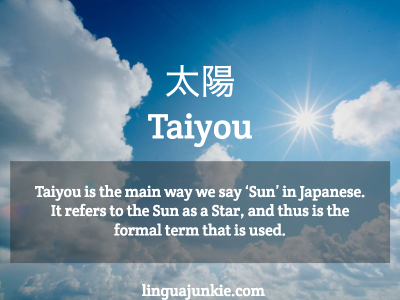
2. 日
- Hi
Hi, pronounced as “he,” is the more casual way of calling ‘Sun’. Hi also means ‘Day’ or ‘Daytime’, which is why the days of the week in Japanese (Monday – Sunday) contain this kanji!
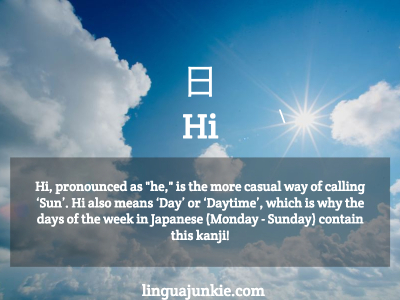
3. お日様
- Ohisama
Ohisama is most likely the first word Japanese babies learn when learning how to refer to the ‘Sun’. It is only used by kids up until a certain age, when they are guided to say Hi (日) or Taiyou (太陽). It is the phrase that is used in children’s books, and used by adults who are speaking to children. The addition of the word ‘Sama’ (様) is a way of showing respect towards the Sun.
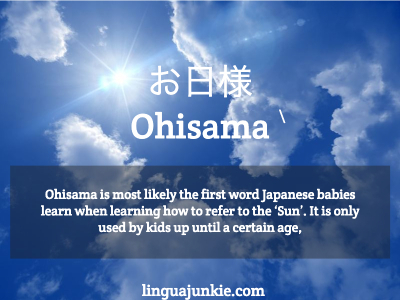
4. お天道様
- Otentosama
Otentosama is a phrase that combines both respect to, as well as intimacy with the sun. Which brings us to a Japanese saying….
5. お天道様が見ている
- Otentosama ga miteiru
Japanese people have a saying that is, Otentosama ga miteiru (お天道様が見ている). This literally means, “Sun is watching”. It expresses the idea that although there may not be other people around watching you commit a bad deed, the sun is always present to see what you are doing. Even if you are not committing a crime, it is an encouragement to always be on your best behavior.
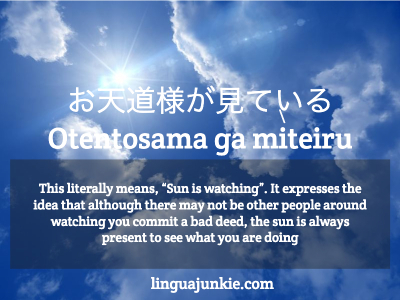
6. 日の出 / 初日の出
- Hinode / Hatsu・hinode
As previously mentioned, Hi (日) means Sun. The last kanji, De (出), means ‘to come out / exit’. These words together make Hinode, which means ‘Sunrise’. It is a term you will frequently see on weather forecasts, when they show the time of Sunrise. Hatsuhinode (初日の出) is a special version of Hinode, as it refers to the first sunrise of the year. A lot of Japanese people will go to see Hatsuhinode as it is said to bring good luck and prosperity.
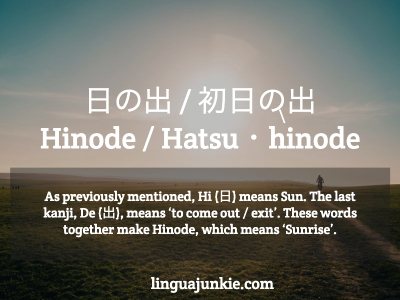
7. 朝日
- Asahi
Asa (朝) means ‘morning’, and Hi (日) means ‘sun’; together, Asahi means ‘morning sun’. It is a common company name, as there is a beer company named Asahi, as well as a newspaper company called Asahi Shinbun.
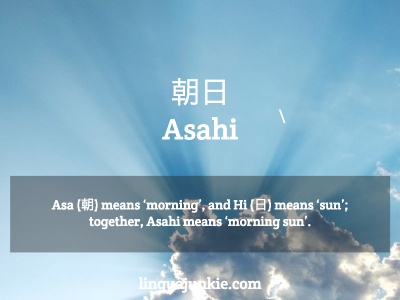
8. 日光
- Nikkou
Nikkou means ‘sunlight’. But, you might also know this word as the city, Nikkou, in the Tochigi Prefecture. In this city, there is the Toushougū shrine, which is famous for important cultural and historical properties. The Toushougū shrine is dedicated to Tokugawa Ieyasu, the founder of the Tokugawa shogunate. It was initially built in 1617, during the Edo period. Nikkou city is also a tourist attraction during the autumn season, as they are known for a particular slope known as Irohazaka (いろは坂).
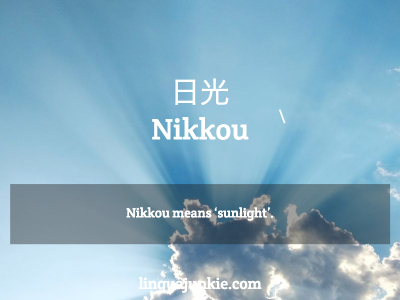
9. 日光浴
- Nikkouyoku
Similar to the word above…
There is also term called Nikkouyoku (日光浴) which translates to ‘sun bathing’. An activity many of us take part in during the hot, summer season.
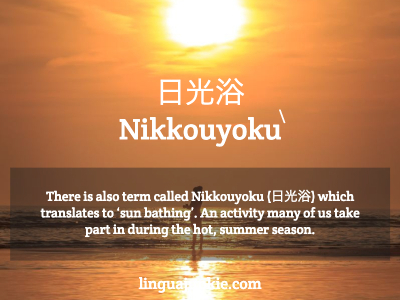
10. 日向
- Hinata
Hinata (日向) is one of those beautiful Japanese words that refers to an area where the Sun is shining onto. You might also know it as a female name, especially in anime.
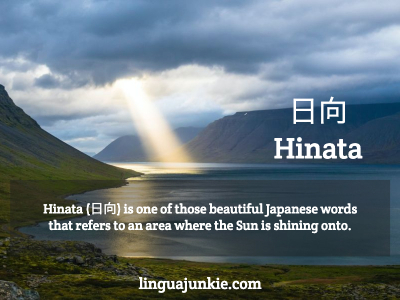
Now, there’s another sun-related word that comes from this…
11. 日向ぼっこ
- Hinatabokko
The phrase Hinatabokko means, ‘basking in the sun’. It connotes a very peaceful feeling, where you are able to enjoy the warmth of the sun within your body. This is why Hinatabokko is not the same as sun-bathing, which we mentioned before as Nikkouyoku (日光浴).
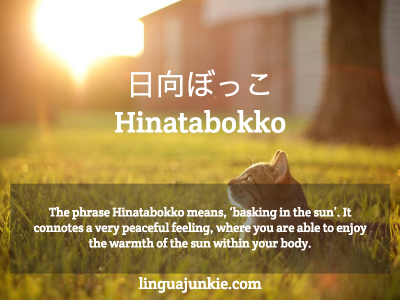
Sun-bathing is usually during summer weathers, where one is laying under the scorching hot sun. On the contrary, Hinatabokko is a very relaxing experience under the warm sun, and thus is usually associated with something one would do in the colder weathers.
12. 木漏れ日
- Komorebi
Komorebi is another phrase that cannot be directly translated into English, as it requires an understanding through the senses. To describe Komorebi, you can imagine being in the woods, surrounded by many trees on a sunny day. Komorebi refers to the phenomenon of sunlight filtering through these trees, resulting in thin beams of light shining through the woods. It may not be the brightest light, but it is a phrase to describe this special effect, associated with peace and calm.
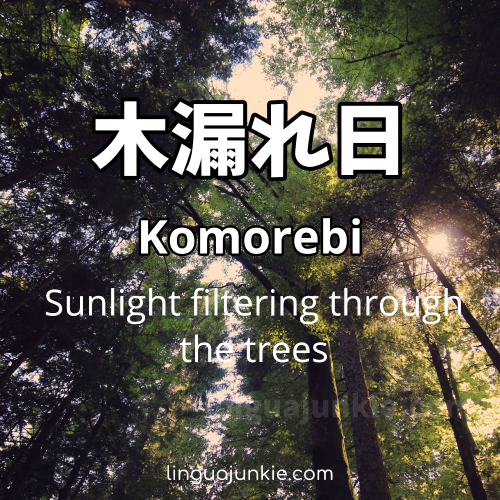
13. 夕陽・夕日
- Yūhi
Yūhi refers to the evening sun. It is the phase before sunset. When the Yūhi is very bright, we call it Yūyake (夕焼け). Yū (夕) refers to evening, and yake (焼け) means burning, expressing how the sun is very bright, as though it is burning the sky. You can use the term Kirei na Yūhi (綺麗な夕日) or Kirei na Yūyake (綺麗な夕焼け), both describing how the evening sun is beautifully bright.
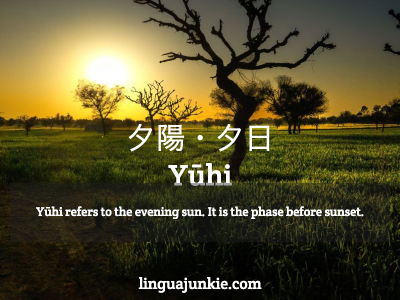
14. 日の入り
- Hinoiri
Hinoiri refers to a sun set. It is the moment the sun disappears from the horizon. It is both a casual as well as a scientific term to describe the sunset.
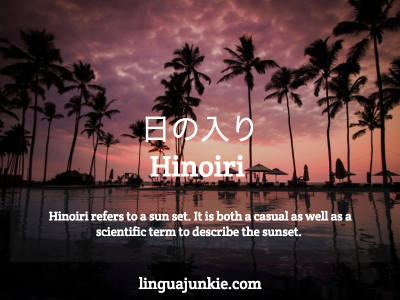
Now that you know some common Japanese words for sun…
In literature, there are terms used by authors to differentiate the sun in different seasons. These terms are able to create a specific sensation. For example, when Shunyou (春陽) is used, it would create a warm, peaceful atmosphere. However, when Sekijitsu (赤日) is used, it would create the image of strong heat from a scorching sun. So. here are the terms associated with the different seasons:
15. 春陽
- Shunyou
Refers to the spring sun.
16. 赤日
- Sekijitsu
Refers to the summer sun.
17. 秋の日
- Akinohi
Refers to the autumn sun.
18. 冬日
- Toujitsu
Refers to the winter sun
Back to You!
Now you how to say sun in Japanese…
Plus, the many kinds of Japanese words for sun.
The Japanese language has a variety of other interesting words like… beautiful Japanese words if you click the link.
Anyway, which word was your favorite?
Leave a comment! I read them all.
– The Main Junkie